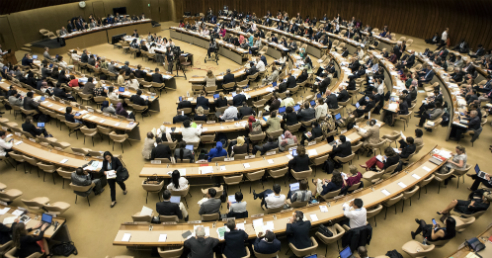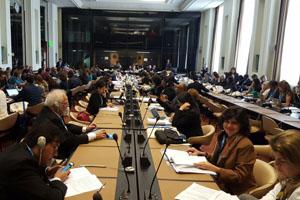Fiocruz participates at 70th World Health Assembly
22/06/2017
André Costa (CCS)
Held from May 22 to May 31, the 70th World Health Assembly, which elected an African as the director-general of the World Health Organization (WHO) for the first time, had an active participation of Fiocruz in several forums and meetings, discussing and promoting its understanding of global health. The zika virus infection, antimicrobial resistance (AMR), access to vaccines and medicines, advances in the conduction of the 2030 Agenda, and international support to tackle yellow fever were among the topics discussed by the institution in several bilateral and multilateral forums and meetings.
Fiocruz's president, Nísia Trindade Lima, the coordinator of the Fiocruz Global Health Center, Paulo Buss, and international representative Luiz Augusto Galvão composed the Brazilian delegation in Geneva, alongside with the Brazilian Minister of Health, Ricardo Barros, and other members of the Brazilian government.
Already in the first day of meetings (5/22), in a meeting held by the Brazilian delegation and the Ministers of Health of the Community of Portuguese Language Countries (CPLP), subjects deeply related to Fiocruz’s international actions received attention and analyses.
Discussions included efforts to develop human resources, access to medicines and other resources essential to health services, and the implantation of human milk banks in African countries. The return of the ePortuguese network as a pivotal element for accessing information and scientific interchange in such common language-based community (all of them being initiatives with direct involvement of Fiocruz) was also a focus of the discussion, with clear concern in advancing the projects.
“Fiocruz is more than committed with the reinforcement of the Structural Networks of the CPLP's Health Cooperation Strategic Plan, and it is also helping to accelerate the creation of National Public Health Institutes in the members states that still do not have them, such as São Tomé and Príncipe, East Timor, and Ecuatorial Guinea”, said Lima at the meeting. “Its commitment is also present in the formation of schools of public health staff and technical centers for installing and maintaining health equipment under a perspective of its higher involvement in implementing and monitoring the SDGs and the 2030 Agenda.”

Deputies in the 70th World Health Assembly (Picture: WHO/L. Cipriani)
Bilateral meetings
In a bilateral meeting, Brazil and Portugal signed a collaboration agreement between both countries in public health subject such as the reinforcement of the existing bilateral projects on collaboration in teaching and research and also Fiocruz-supported efforts in accessing medicines and forming human resources. The proposal for including Portuguese as official language in WHO was also discussed.
In another bilateral meeting, the Brazilian and the Canadian ministers signed a letter of intent for collaboration between both countries in public health subjects. After the signing, Fiocruz's chairperson participated in the discussion about possible collaboration subjects, such as indigenous health, chemical safety, and health science, technology, and innovation as significant elements to implement the 2030 Agenda.
Canada was also involved in negotiations in a bilateral meeting between Fiocruz's delegation and the scientific director of the Institute of Population and Public Health of the Canadian Institutes of Health Research (CIHR), Steven Hoffman. It was agreed that, in order to enable the development of common projects, a collaboration term will be set between both institutions in continuation to what was discussed in this first encounter.
Another meeting involved the Brazilian and the American health ministers, with the presence of the Center of Disease Control (CDC)'s and Fiocruz's chairpersons. Initiatives implemented by Fiocruz jointly with the United States National Institutes of Health (NIH) received consideration, such as the cohort study about the infection of pregnant women and children by the zika virus, research projects about AIDS, and also initiatives related to collaboration in the field of sanitary regulation and surveillance.

Fioocruz delegation in a meeting in Geneve.
Meetings with multilateral bodies
In a meeting with the office of WHO's Director-General, an update of the reference terms of WHO's collaborating centers in Fiocruz was discussed, in order to approximate such centers even more to the 2030 Agenda and its sustainable development goals, such as economic inclusion; science, technology, and innovation in health systems; environmental sustainability; and equity in health, peace, and safety. Suggestions from scientists for panels in the drug area were also solicited to Fiocruz, and it was agreed that a discussion will be kept to set activities in human resources, research, and technological development.
When visiting the head office of Unitaid, a UN entity dedicated to ensure low prices for medicines and access to such products in developing countries, its Director-General, Celso Amorim, showed the schedule for work, evaluation strategy and current convocations to present proposals. Besides the proposals Fiocruz already participates in, the presence of a line on vector control was noted, and such line will enable to present proposals based on Fiocruz Manaus's expertise in applying larvicides by using traps.
Another meeting with the Americas Group (Grua) included a discussion about the yellow fever issue in the Americas. Nísia briefly explained the subject and Fiocruz's contribution. An invitation was also made in such scope for the countries to participate in the meeting on health science and technology to implement the 2030 Agenda, which will be held in November at Fiocruz.


